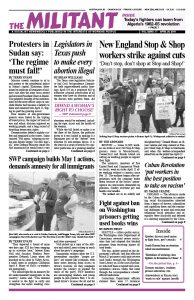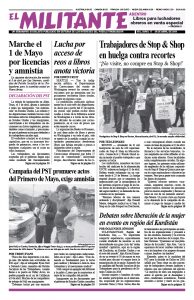Massive crowds continue to sit in and protest at the presidential palace in Sudan’s capital, Khartoum, determined to eradicate all remnants of military rule after the army brass ousted and arrested President Omar al-Bashir. The powerful breadth of the mobilizations led the army officer corps to conclude Bashir had become a liability to them and removed him April 11, hoping to quell the growing unrest.
Four months of anti-government protests were fueled by the tripling of bread prices, the impact of years of war and ethnic division imposed on working people, and a long record of throttling democratic rights.
Demonstrators defied a nightly curfew and remained in the streets. Some chanted “Fall again,” adapting an earlier anti-Bashir slogan “Just fall, that’s all,” after Defense Minister Awad Ibn Auf announced he would head a two year “transition” period of military rule, and extended the state of emergency from one to three years.
Ibn Auf was appointed head of the military council April 11. Deeply involved in Bashir’s brutal war on the peoples of Darfur, in western Sudan, he is widely hated. Within 24 hours he was gone, replaced by Lt. Gen. Abdel Fattah al-Burhan.
One of the hallmarks of the youthful protests has been insistence that the rulers could no long succeed in using racial, national or religious differences to divide them. “We are all Darfur” became a popular slogan.
Bashir fell days after hundreds of thousands gathered outside the presidential palace and the army headquarters in Khartoum April 6, the largest protest since the uprising began. Demonstrations were organized across the country. The elite troops of the widely despised National Intelligence and Security Services attempted to break up the action in the capital, but some soldiers fired warning shots to force the NISS to back off.
The middle-class Sudanese Professionals Association — which has led the protests — said that replacing Bashir with a military council just “reproduced the same faces and institutions that our courageous people have revolted against.”
Hundreds of thousands took to the streets of Khartoum April 12 after the professionals association called for ongoing protests until a civilian government is appointed. Many brought food and water to sustain those camped outside the presidential palace. This led the military council to agree to negotiations with opposition forces and protest organizers April 13.
The army “killed many people” when the struggle to oust Bashir began, A Alsayad, a London shopkeeper originally from Sudan, told Militant reporters at an April 13 solidarity action outside the Sudanese Embassy in the U.K. “A new person is in power, but we don’t trust these people,” he added. “It’s why people keep protesting.”
Toilers faced divisions, repression
Months before the protests began workers and farmers faced shortages of food, medicine and fuel and an unemployment rate of 27%.
They have also borne the brunt of a series of wars waged by Bashir and his predecessors. All the country’s rulers since Sudan’s independence from British colonial rule in 1956 have wielded divisions cultivated by the British colonists among the Sudanese people, based on tribe, national origin and religion.
“They tried to divide us, Arabs against blacks,” Taz Ahmed, a Sudanese student in London, told Militant reporters at the April 13 London protest.
A decadeslong civil war, in which 2 million died, ended in 2005. South Sudan seceded six years later. This meant the Sudanese capitalist rulers lost control of most of the country’s oil resources and revenue. From 2003 Bashir unleashed a thug militia against the toilers in Darfur, where armed groups were fighting to end discrimination against non-Arabic peoples there. Over a million have been driven from their homes in these conflicts.
Over time, these intolerable conditions imposed on working people in Sudan led to widespread discontent that has exploded. Similar economic crisis, wars and repression led to sustained revolts and toppled hated governments in Tunisia and Egypt in the Arab Spring in 2011. Like in Sudan, these uprisings opened political space for working people to discuss and debate a way forward.
But no leadership emerged from these battles that drew on the lessons of previous revolutionary struggles, like the Cuban Revolution and popular revolutionary governments like that led by Thomas Sankara in Burkina Faso. This is what is needed for working people to chart a course independent of the capitalist rulers, as well as Washington and other imperialist powers, to mobilize the oppressed and exploited in a fight to take political power into their own hands in Sudan and elsewhere.
Andrés Mendoza and Dag Tirsén in London contributed to this article.

